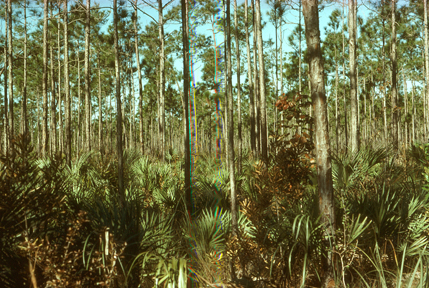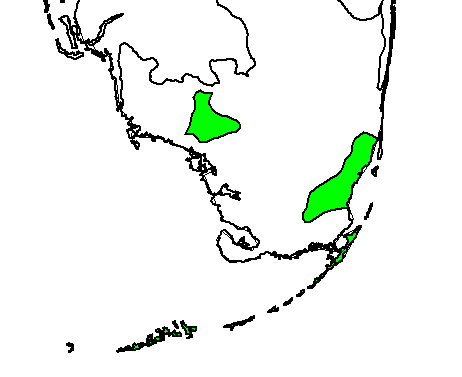
Pine woods and Serenoa repens (saw palmetto), Pinelands Trail, Everglades National Park, Florida (c) 2004 Maurice J. Kaufmann
Bioimages home (click on an image to enlarge)
view
this page in its intended navigation context
South Florida Rocklands
(WWF
ecoregion
NT0164)

Pine woods and Serenoa repens (saw
palmetto), Pinelands Trail, Everglades National Park, Florida
(c) 2004 Maurice J. Kaufmann

Source of ecoregions data:
Olson, D. M. and
E. Dinerstein. The Global 200: Priority ecoregions for global conservation. (PDF
file) Annals of the Missouri Botanical Garden 89:125-126.
Distinctiveness (1=highest,4=lowest): 2
(regionally outstanding)
This ecoregion contains the only true tropical forest on the U.S. mainland.
Many plant species are restricted to this area and 37 endemic species of herbs
are endemic to the pine rocklands.*
Conservation Status (1=most endangered, 5=most
intact): 1 (critical)
Only 2% of the original habitat remains. Development in the Miami area and
on the Keys has destroyed most of this area, making it one of the most
endangered ecoregions. In addition to development, fire suppression and
introduction of exotic species are serious threats.*
 Rhizophora mangle (American mangrove) (c) 2004
Maurice J. Kaufmann
Rhizophora mangle (American mangrove) (c) 2004
Maurice J. Kaufmann
Associated habitats
slash pine woodland, Everglades Ntl. Park, Florida



(left) If unburned, the pine woodlands are invaded by hardwoods. (center) Low
intensity fires destroy the hardwoods but not the pines. (right) After a burn,
palmettos quickly recover.
(c) 2004 Maurice J. Kaufmann
hires
hires
hires
mangrove (Rhizophora mangle) island, Florida Bay, near Bahia Honda State Park, Florida

(c) 2004
Maurice J. Kaufmann
hires
* Ricketts, T.H., E. Dinerstein, D.M. Olson, C.J. Loucks, et al. (1999) Terrestrial Ecoregions of North America: A Conservation Assessment. World Wildlife Fund - United States and Canada. Island Press, Washington, D.C. pp. 150-152.
Except as noted, images copyright 2002-2004 Steve Baskauf - Terms of use